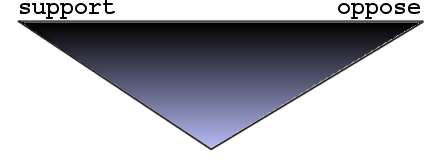|
supporting arguments
41% ·
[make argument]
67%
· dependence
by wikipedia on 2005-04-01 05:36:17
Subsidies encourage organic farming (wikipedia.org) and precision agriculture (wikipedia.org), often combined in the idea of the "garden economy". When the USSR was unable to feed itself it was often observed that over half of the local food supply was coming from small private gardens growing native varieties with organic means, despite the fact that the government had done everything in its power to discourage such small-scale organic entrepreneurs.
Subsidies improve biosecurity (wikipedia.org) by minimizing the amount of overall organic material imported, e.g. recent United States Food and Drug Administration (wikipedia.org) rules applied to foreign exporters of food to the US.
A key stated goal of agricultural subsidies is food self-sufficiency to prevent the shock of rapid price rises in essential groceries. To submit the entire food supply of a nation to the whims of commodity markets (wikipedia.org) is considered a poor idea.
Most agricultural policy or subsidy has purposes other than profit. A very strong evidence for this is that huge amounts of excess food are often disposed of very cheaply, e.g. by export to developing nations as foreign aid (wikipedia.org), or as part of local food bank or food stamp (wikipedia.org) programs. Agricultural economics (wikipedia.org) studies these 'other purposes' to see what insights they provide into economics, and to help set such policies in the context of a larger economy in which most activity is not agricultural.
|
opposing arguments
58% ·
[make argument]
100%
· free trade
by wikipedia on 2005-04-01 05:48:12
Subsidies prevent farmers in the third world from competing in local and export markets, thereby creating third world poverty. This line of reasoning is increasingly used as the main opposition to subsidies, as exemplified by the 2003 Cancun WTO ministerial conference, where 22 third-world nations strongly argued against agriculture subsidies in US and Europe. Their complaint is that the first world talks about free trade (wikipedia.org) and free markets (wikipedia.org), but does not implement them when their agriculture products are subject to competition by cheaper products from the third world. In April 2004, the WTO (wikipedia.org) ruled that $3 billion in US cotton subsidies violate trade agreements and that almost 50% of EU sugar exports are illegal.
78%
· those in power
by wikipedia on 2005-04-01 05:41:56
The real rationale is simple vote-seeking - politicians aim for votes, not the state's well-being, and the two can diverge. Only a small percentage of the population actually works in agriculture in the West (about 5% in the European Union in 1997 and 1.7% in the United States in 1990). The subsidies that benefit this minority indirectly drive up food prices for the majority (that milk carton you buy actually cost more to make than you paid for it - the other 40% of its cost came from your tax dollars which the government gave to the farmer who made it!). Why, then, would this state of affairs persist in a democracy? Since the harm to the >95% is relatively minor, it is not usually enough to change their voting pattern; whereas it is almost the sole issue for the <5%. Thus, it arguably makes political sense to maintain subsidies.
50%
· who does it help?
by wikipedia on 2005-04-01 05:43:35
The small farmers are not the primary beneficiaries: rather, the majority of the monies go to larger agricultural firms. Such cases sometimes provoke considerable publicity, since these policies usually claim to support the small farmer. Some farmers are actually opposed to subsidies because they tend to result in overproduction and lower prices, which then increases future reliance on subsidies. Thus a vicious downward spiral is formed, which becomes increasingly more difficult to escape from.
Corn subsidies in the US have been indicated as a major cause of obesity; subsidized and consequently cheaper corn syrup (wikipedia.org) is often used instead of plain sugar to sweeten processed foods.
|
Powered by Debatepoint.
All text is available under the terms of the GNU Free Documentation License.
